Guidance and Challenging Behaviors
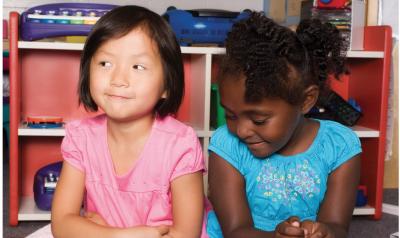
Spotlight on Young Children: Challenging Behavior
Learn more about Spotlight on Young Children: Challenging Behavior
Authored by
Authored by:
Charis L. Wahman, Janice K. Lee
Members Only
 playing with a truck toy." width="250" height="125" />
playing with a truck toy." width="250" height="125" />
Young Children
March 1, 2023
Functional Assessment and Positive Behavior Support: The Role of Early Learning Program Leaders and Teachers
Functional analysis is a tool that allows educators to figure out the purpose or function of challenging behavior as well as the events that trigger and maintain it.
Authored by
Authored by:
Barbara Kaiser, Judy Sklar Rasminsky
Members Only
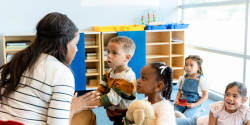
Young Children
September 1, 2022
A Three-Step Approach: Promoting Young Children’s Self-Regulation and Language During Conflict
This article presents a three-step approach to address common behavioral challenges and social conflicts in early childhood settings.
Authored by
Authored by:
Kyla McRoy, Hope K. Gerde, Laurie Linscott
Members Only

Young Children
December 1, 2021
Tearing Down Silos: A Model for Interagency Collaboration
This article shares a collaborative approach that two counties in Pennsylvania have taken to tear down the silos and instead promptly and effectively support early learning programs and staff and the children and families they serve.
Authored by
Authored by:
Alison Mellott
Members Only
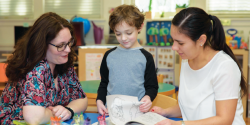
Teaching Young Children
July 1, 2021
Message in a Backpack™ Guiding Your Child’s Behavior
Challenging behaviors often happen when children feel they don’t have another way to express their feelings or another way to get what they need. Here's how to stay calm, patient, and consistent as you help your child understand your expectations.
Authored by
Authored by:
Keri Giordano
Members Only

Teaching Young Children
July 1, 2021
Instead of Discipline, Use Guidance
Using guidance instead of discipline means helping young children understand they can learn from their mistakes, and it starts with showing them how to do so.
Authored by
Authored by:
Dan Gartrell
Members Only
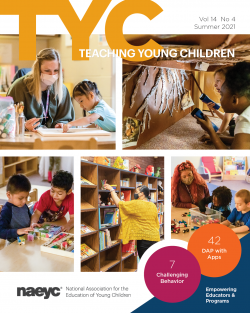
Teaching Young Children
Vol. 14, No. 4
July 1, 2021
Summer 2021
Empowering Educators & Programs: A Blueprint for Excellence
Teaching Young Children is NAEYC's magazine for anyone who works with preschoolers. Colorful, informative, and easy-to-read, TYC is packed full of teaching ideas, strategies, and tips.
Members Only

June 10, 2021
A Road Forward: Five Democratic Life Skills for a Civil Society
Five democratic life skills provide a model for the holistic education and development of children, guiding them along a continuum from showing resilience in the face of trauma to demonstrating intelligent decision-making as members of society.
Authored by
Authored by:
Dan Gartrell
Members Only

NAEYC Publishes New Book on Addressing Challenging Behavior in Young Children
NAEYC Publishes New Book for Addressing Challenging Behavior in Young Children
Members Only
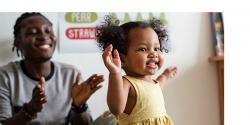
Young Children
March 1, 2021
Becoming a Better Behavior Detective: Applying a Developmental and Contextual Lens on Behavior to Promote Social and Emotional Development
Sharpening our “behavior detective” skills requires us to use reflective practices to apply our knowledge of development in service of understanding the individual infant or toddler.
Authored by
Authored by:
Claire D. Vallotton, Jennifer A. Mortensen, Melissa M. Burnham, Kalli B. Decker, Marjorie Beeghly
Members Only

Young Children
July 1, 2015
Rocking and Rolling—It Takes Two: The Role of Co-Regulation in Building Self-Regulation Skillsالتناغم والتآزر - يد واحدة لا تص فِّق: دور التنظيم المشترك في بناء مهارات التنظيم الذاتي عند الطفل
عندما يعاني الأطفال من التنظيم الذاتي ، يصعب عليهم الجلوس والتركيز والمشاركة في أنشطة التعلم.
Authored by
Authored by:
Linda Groves Gillespie
Members Only
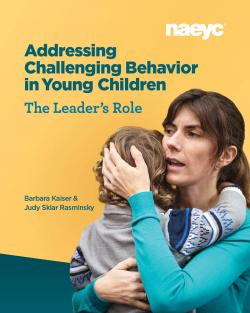
February 9, 2021
Addressing Challenging Behavior in Young Children: The Leader's Role
Learn more about Addressing Challenging Behavior in Young Children
Authored by
Authored by:
Barbara Kaiser, Judy Sklar Rasminsky
Members Only

Teaching Young Children
September 16, 2020
Message in a Backpack™ Helping Your Child through Change
We gathered insights from individuals with various perspectives and roles in early childhood. Here, you will read excerpts of what some of them would share with families about supporting children during this period of rapid change.
Members Only

Teaching Young Children
September 16, 2020
Supporting Anxious Children in the Preschool Classroom
The three de-escalation activities detailed here can be useful in targeting anxiety—two are used for de-escalating children’s anxious behaviors, and the third assists children in identifying the cause of their anxiety and in developing coping skills.
Authored by
Authored by:
Sierra L. Brown, Allison McCobin, Stephanie Easley, Kara E. McGoey
Members Only

Teaching Young Children
September 16, 2020
Partnering with Families Supporting Social and Emotional Development through Picture Books
Here are three strategies you (as the teacher) can use to help families turn picture books into tools to prompt rich conversations about expressing feelings, gaining self-esteem, showing perseverance, and many other important skills.
Authored by
Authored by:
Alison Hooper
Members Only
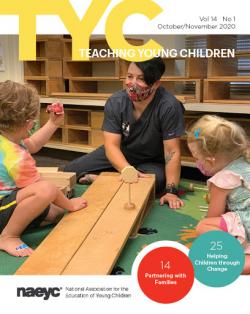
Teaching Young Children
Vol. 14, No. 1
September 16, 2020
October/November 2020
Partnering with Families, Helping Children through Change
TYC October/November 2020 issue
Members Only

التفاهم مع الأطفال الذين يمارسون سلوك العض وطريقة الاستجابة لهم Understanding and Responding to Children Who Bite
This article will help you to understand the reasons young children bite and give you some ideas and strategies for responding appropriately.
Members Only
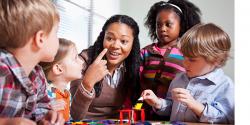
Young Children
May 1, 2020
“How Can I Help You?”: Reconsidering Behavior Management
Given that many teachers feel they are not well prepared to manage behaviors in a classroom (Pavri 2004), we have intentionally pursued this topic in our professional endeavors as teacher educators, observing hundreds of preservice and in-service teachers
Authored by
Authored by:
Adam L. Holland, Kathryn A. Ohle
Members Only
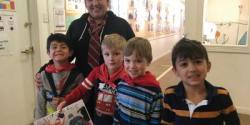
Teaching Young Children
October 1, 2018
انظر واسمع وتعلم: اللطف في المعاملة Look, Listen, Learn: The Kindness Movement
Read the following story and teacher reflections; use the Reflective Questions to deepen your thinking and shape your teaching practices.
Authored by
Authored by:
Nadia Jaboneta, Deb Curtis
Members Only

Teaching Young Children
February 1, 2020
Ask Hello. How to Handle Hurtful Words
In a recent Hello discussion, a member asked for advice on how to react when children use words that are hurtful or unsuitable for early learning spaces.
Members Only
Become a Member
Support our efforts to secure a bright future for young children, educators, and families.
Support NAEYC
Donate to help NAEYC advance a strong and dynamic early childhood profession and connect educators to cutting-edge resources.
Find Your Affiliate
Connect with professionals in your community at conferences, networking events, advocacy efforts, leadership opportunities and more!



 playing with a truck toy." width="250" height="125" />
playing with a truck toy." width="250" height="125" />
















